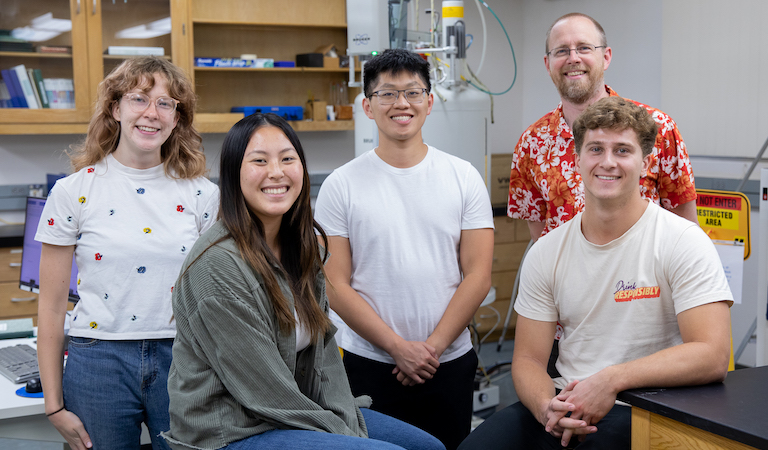Chemistry Department Goals

The Department of Chemistry seeks to maintain a high-quality faculty, a critical mass of talented students, and the other resources necessary to achieve the following goals for our students.
Part I: Goals for Chemistry Education
A. For all Harvey Mudd students to understand the fundamental principles of chemistry and to have the background necessary to understand the impact of chemistry on our society.
Student Learning Outcomes:
- Students will demonstrate a basic knowledge of chemistry in the areas of
- structure
- dynamics
- energetics
- Students will demonstrate an understanding of society’s demands upon chemistry as well as the advances in quality of life made possible by chemical science.
B. For all Harvey Mudd students to understand how fundamental chemical principles can be applied to the solution of real problems in a variety of technical fields.
Student Learning Outcomes:
- Students will demonstrate sufficient background and depth in chemistry to be able to successfully complete any of the majors offered at Harvey Mudd College.
- Students will demonstrate that they have appreciated the contributions of chemistry to at least one problem facing society.
C. For all Harvey Mudd students to understand how chemists successfully study and interpret chemical and physical phenomena through experimental investigations using high-quality modern instrumentation.
Student Learning Outcomes:
- Students will demonstrate that they can keep an adequate record of experimental investigations.
- Students will demonstrate that they can execute an experiment to measure a chemical property using typical instrumentation.
- Students will demonstrate that they can interpret results of experimental measurements via the application chemical theory.
Part II: Goals for the Chemistry Major
A. For all Harvey Mudd chemistry graduates to have a broad and intense education in chemistry, approved by the American Chemical Society, so that they may succeed in any professional career track they choose.
Student Learning Outcomes:
- Senior chemistry majors will be able to demonstrate a mastery of factual knowledge comprehensively across the five principal areas of chemistry (organic, inorganic, physical, analytical, and biochemical), and be able to analyze and solve problems, understand relationships, and interpret scientific facts and data.
- Students completing the chemistry major will meet the certification requirements as set forth by the American Chemical Society Committee on Professional Training
- Students completing the joint major in chemistry and biology will have the option of earning certified degrees in biochemistry with the addition of one to two courses.
- Chemistry graduates will be successful in gaining entrance into high-quality graduate schools in chemistry and allied fields, admission to professional schools, and securing quality careers in the chemical sciences and other fields.
B. For all Harvey Mudd chemistry graduates to have a quality research experience so that they may understand the ways in which new scientific knowledge is created.
Student Learning Outcomes:
- Students will demonstrate that they can independently find and use information pertinent to their research efforts.
- Students will demonstrate an understanding of the relationship of their project to the current literature.
- Students will demonstrate an understanding of the broader impacts of their work on society.
- Students will demonstrate that they can design and execute an experiment to test a hypothesis or answer a specific question.
- Students will demonstrate that they can analyze experimental results, draw appropriate conclusions, and suggest next steps.
- Students will demonstrate that they can effectively communicate the findings of their work in oral, visual, and written form.
- Students will master and apply an experimental or theoretical technique at a level beyond that presented in the core chemistry curriculum.
C. For all Harvey Mudd chemistry graduates to develop the ability to communicate scientific ideas clearly and effectively.
Student Learning Outcomes:
- Students will demonstrate that they can produce a thesis describing an open question in the field of chemistry, its context, a method of addressing that question through experimental work, the results of the study, and pertinent conclusions.
- Students will demonstrate that they can frame an open question in the field of chemistry in the course of a short oral presentation, utilizing audio-visual aids of high quality.
- Students will demonstrate that they can, through research conducted in the major courses and through Senior Thesis, report on their contributions to an open question in the field of chemistry through an oral presentation of sufficient length and depth, utilizing audio-visual aids of high quality.
- Students will demonstrate that they can frame an approach to solving an open question in the field of chemistry and communicate it to an educated layperson in the space of two printed pages.